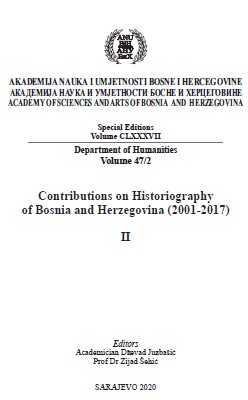Локалне монографије у дијелу Босанске Крајине и Посавине (2001–2017)
Local monographs in part of the Bosnian Krajina and Posavina (2001-2017)
Author(s): Aranđel Smiljanić
Subject(s): Transformation Period (1990 - 2010), Present Times (2010 - today), Source Material
Published by: Akademija Nauka i Umjetnosti Bosne i Hercegovine
Keywords: historiography; local monographs; Bosnian Krajina; Posavina; analysis; authors; shortcomings; historians; possibilities;
Summary/Abstract: Many local monographs were published in Bosnia and Herzegovina in the period between 2001 and 2017. Most of the monographs were related to villages, while the monographs of cities were somewhat less represented. Local history data also includes monographs on schools, businesses, sports clubs, cultural and artistic societies and families. This paper analyses the monographs from the western and northern parts of our country (Bosnian Krajina and Posavina). Local monographs seem to be increasingly popular and are read more than scholarly works in general and national history. Many local monographs at the same time do not deliver particularly high quality. Moreover, the quality of most of these monographs could be described as average or even below that. The problem is that local monographs are mostly written by persons who are not historians nor have any foundation in history criticism. Usually these authors do not distinguish between their sources and literature. Works by most of them do not have a critical apparatus in the form of notes, and their records can hardly be verified. Sometimes there is not even a list of sources and literature, and if there is one, it is modest at best, while their archival work is unknown. Wherever historians were hired as authors or co-authors, these local monographs are of much better quality. Similar can be said of those monographs whose reviewers were historians. Therefore, most local monographs have historiographic significance but not greater scientific value. The necessity of systematic study of local history imposes itself as the solution, where the best course of action would be to engage historians, especially young and talented researchers who have distinguished themselves during their undergraduate studies or have successfully completed master studies in history, and yet are jobless in their profession. This would create a dual benefit: we would get better quality monographs of villages and cities and, for the most part, would solve the problem of unemployed historians, who are increasingly present in the labour market. This would be a job for a municipal or city historian, who would not only do the work of writing local monographs, but also other tasks in the sphere of public and cultural life of the municipality or city in which they live. In order to realize this noble idea, it is necessary to have joint approach of the departments, faculties, universities, museums, archives, academies, or associations towards the institutions of government. Furthermore, greater engagement is needed in the future in order to ensure better study of local history in schools. The implementation of this idea would bring multiple benefits – greater knowledge of students about the past of their homeplaces and securing a teaching standard, with the possibility of hiring those history professors who do not work in their profession.
Book: Prilozi o historiografiji Bosne i Hercegovine (2001–2017) II
- Page Range: 109-126
- Page Count: 18
- Publication Year: 2020
- Language: Serbian
- Content File-PDF

